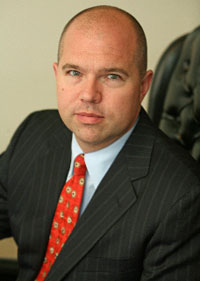D.C. Council gives first nod to marriage equality bill

Openly gay D.C. Councilman David Catania said he’s willing to work with the Catholic Church to find a compromise on the city’s marriage equality legislation.
Gay councilman still seeking to resolve Catholic discontent
The City Council of Washington, D.C. voted 11 to 2 today to support a bill to provide marriage licenses to same-sex couples the same as it provides to straight couples.
“Today’s vote is an important victory –not only for the gay and lesbian community but for everyone who supports equal rights,” said openly gay Councilman David Catania, following Tuesday’s vote. Catania sponsored this bill and a bill, passed in April, which enabled the District of Columbia to recognize same-sex marriages licensed in other jurisdictions.
Tuesday’s vote, while significant, is not final. The Council must again approve the bill on a second “reading” –expected December 15— and the possibility exists that it will be amended to give additional exemptions to religious institutions. Also, the bill must pass through a 30-day Congressional review period.
Sultan Shakir, director of the Human Rights Campaign’s east coast field operation, said HRC expects reaction to the D.C. marriage equality bill will be similar to the marriage recognition bill last April. House Speaker Nancy Pelosi essentially refused to allow any opposition to the marriage recognition law to reach the floor; both chambers must vote to overturn a D.C. law before Congress can repeal it, and the president must sign such a repeal.
If all goes smoothly on the marriage equality bill, the earliest it could be enacted, said Catania Chief of Staff Ben Young, is late February or early March.
It’s not at all clear how smoothly things might go. And there is considerable opposition outside Council chambers—most of it from religious organizations. A group of local clergy has been waging a vociferous campaign against the bill –both in Council and in efforts to stage a referendum. Then late last month, the Archdiocese of Washington threatened to end its partnership with the city on programs for the needy unless the bill includes major concessions to religious organizations that oppose gay civil rights.
Speaking to reporters prior to Tuesday’s vote, Catania said he was and is willing to consider language from the Catholic archdiocese that would make them more comfortable with the bill. But he said a month and a half of his entreaties to those groups has produced nothing.
The bill already provides for religious organizations to be exempt from conducting marriage ceremonies for same-sex couples. But, through the media, the Catholic Church has insisted that the bill must also exempt religious institutions from providing gay employees with the same benefits as straight employees and that it must allow the Catholic adoption services to discriminate against gay couples seeking to adopt.
Supporters of the bill balk at providing such exemptions, saying they deeply undermine the city’s longstanding law against discrimination based on sexual orientation. Catania said he repeatedly offered to work with the Catholic Church to find compromise language acceptable to all.
“I feel we need to get this right,” said Catania, referring to concerns about religious freedom. “Our public space is big enough to accommodate religious freedom and also a secular civil government extending equality to its citizens.”
But instead of offering language, the church turned up the heat on public debate last month, using a now common tactic –it threatened to pull out of publically supported programs to help the needy. According to the Washington Post, Catholic Charities currently takes about $20 million annually in city funds to operate homeless shelters, adoption services, medical clinics, and other services for people with low incomes.
In 2006, the Archdiocese of Boston halted its work to find good homes for needy children because the state insisted the program not violate the state law prohibiting discrimination based on sexual orientation. Rather than comply with that law, the church dropped its adoption program.
Young, Catania’s chief of staff, said it is still possible to amend the bill, should the church offer language that is acceptable prior to the December 15 final vote.
Catania told reporters Monday that he believes a compromise might be similar to one worked out in San Francisco and with Georgetown University in D.C.
“It’s almost a ‘don’t ask-don’t tell’ compromise,” said Catania, in a press conference Monday. In San Francisco, the Catholic service agencies agreed, in the 1990s, to provide equal benefits to one spouse or one adult person who lived with an employee, without requiring the employee to identify the nature of his or her relationship with the adult domicile. A similar proposal was adopted at the Catholic-run Georgetown University.
“I’m willing to look at any language submitted by the Catholic Church that respects their point of view and allows the government to legislate equality,” said Catania.
D.C. Mayor Adrian Fenty, a Democrat and strong supporter of equal rights for the LGBT community, has indicated he will sign the legislation when it reaches his desk.


Leave a Reply